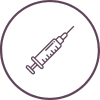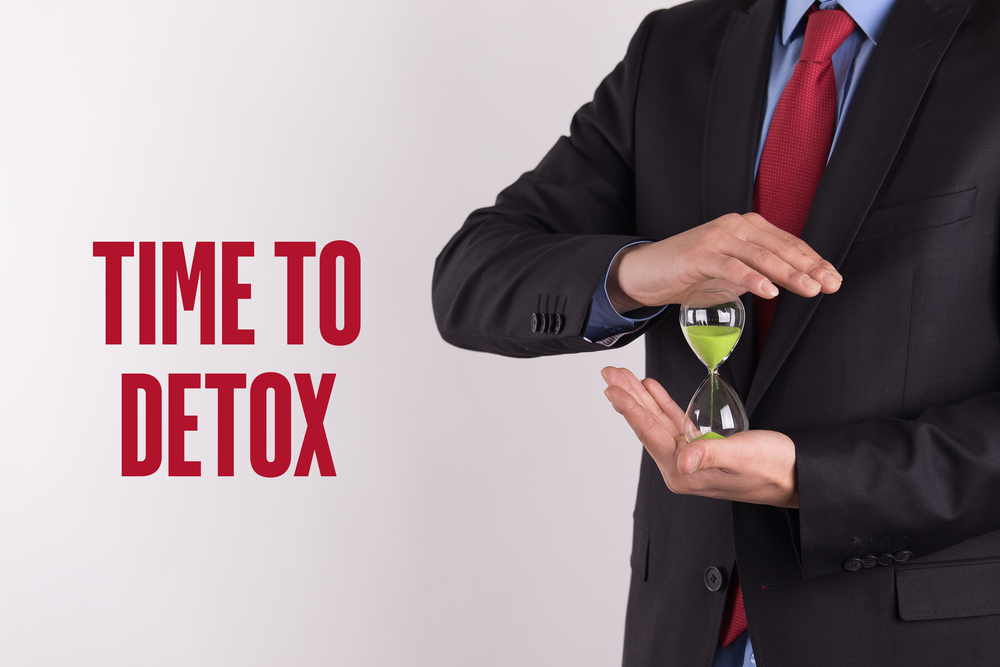
Written by:

Medically Reviewed by:
Last Updated:
December 17th, 2024
Detox | Withdrawal and Detox Timelines
- Select
- Addiction
- Detox
- Rehab Treatment
Imagine yourself trapped in a dense, murky fog that envelops your thoughts and weighs you down, leaving you lost and unsure of how to escape. Detox is like the sun gradually breaking through that fog, dispersing it to reveal a bright, vibrant day and the promise of a fresh start. A professional detox will rid your body of addictive substances and their toxins, break your physical dependence and allow you to embark on the journey to recovery.
Why is detox so important?
Addiction is a multifaceted condition that deeply impacts both your brain and body. When you consume addictive substances, your brain releases neurotransmitters such as dopamine and serotonin, which are responsible for feelings of pleasure and well-being. Over time, your brain adjusts to the constant influx of these chemicals, leading to tolerance and dependence. As a result, you require more of the substance to achieve the same effects, perpetuating the cycle of abuse.
Detox is the process of gradually eliminating those substances from your body, allowing your brain to recalibrate and adjust to functioning without them. As your body goes through this process, you will likely experience withdrawal symptoms, which can range from mild discomfort to life-threatening complications. Professional detox facilities like Recovery Lighthouse provide a controlled environment and medical supervision to ensure that your withdrawal symptoms are safely and effectively managed.
Detox also initiates the healing process by allowing your body to start repairing the damage caused by substance abuse. This restoration is crucial, as it enables you to concentrate on the emotional and mental aspects of your condition during subsequent treatment. This holistic approach is critical for achieving long-term sobriety and personal growth.
What types of detox are available?
There are various detox programmes to help you break the physical dependence on different substances. The two most common types of detox are:
Alcohol detox
Alcohol detox aims to safely and effectively rid your body of alcohol while managing withdrawal symptoms, which can range from mild to severe. Depending on the severity of your dependency and your individual needs, medication may also be used to ease the withdrawal process. Click the button below to learn more.
Drug detox
Drug detox focuses on removing both harmful illicit and prescription drugs from your body and managing withdrawal symptoms associated with drug abuse. This can be tailored to specific drugs, such as opioids, benzodiazepines or stimulants, and may involve medication-assisted treatment to ease your transition.
Home detox
This is when you go “cold turkey” and quit a substance abruptly at home without medical assistance. While this may seem like a quick solution, attempting to detox at home can be dangerous as it lacks the necessary medical supervision, increasing the risk of severe withdrawal symptoms and potential complications.
What are common withdrawal symptoms you may experience?
While different substances produce unique withdrawal symptoms, there are some common symptoms that you may experience during detox:
- Anxiety
- Depression
- Insomnia
- Nausea and vomiting
- Muscle aches and pains
- Tremors
- Seizures
- Hallucinations
- Sweating
It’s essential to remember that each person’s experience will vary which is why professional detox is always advised so the professional medical teams can support you throughout the process.
How long does withdrawal last?
Again, the duration of withdrawal varies depending on the substance, the severity of your condition and your physiology. In general, withdrawal symptoms may last anywhere from a few days to several weeks, with the most intense symptoms occurring within the first few days of detox. At a detox centre like Recovery Lighthouse, your medical team will closely monitor your progress and adjust your treatment plan as necessary.
What is Post Acute Withdrawal Syndrome (PAWS)?
PAWS refers to a set of symptoms that may persist for weeks or months after the initial withdrawal period. As you navigate your recovery journey, you may experience PAWS, which can include mood swings, anxiety, sleep disturbances and cognitive difficulties. It is crucial for you to recognise and manage PAWS during the recovery process, as it can sometimes contribute to relapse. When you detox with Recovery Lighthouse, your treatment team will provide guidance and support to help you cope with PAWS and maintain your sobriety.
Top tips for a successful detox
Embarking on your detox journey can be challenging, but with the right mindset and approach, you can maximise your chances of success.
Here are some top tips to help you navigate the detox process effectively:
1. Commit to the process
Making a firm decision to commit to detox and recovery is crucial. Remind yourself of your reasons for seeking help and the positive changes you hope to achieve. A strong sense of determination will help carry you through the challenging moments.
2. Choose the right detox programme
Select a detox facility that offers personalised treatment plans, professional medical care, and a supportive environment. The right programme will cater to your unique needs and provide the necessary resources for a successful detox.
3. Establish a support network
Surround yourself with positive influences, such as friends, family members and peers in recovery who can offer encouragement and guidance. Engaging in support groups or therapy sessions can also be helpful in fostering connections and sharing experiences.
4. Be patient and kind to yourself
Detox and recovery are not linear processes and you may experience ups and downs along the way. Be patient with yourself and recognise that healing takes time. Practice self-compassion and remind yourself that setbacks are a normal part of the journey.
5. Follow your treatment plan
Adhering to the guidelines and recommendations provided by your detox professionals is essential. They have the expertise to guide you safely through the detox process and address any concerns that may arise.
6. Prioritise self-care
Pay attention to your physical, mental and emotional well-being throughout detox. This may include engaging in activities that promote relaxation such as meditation or gentle exercise and maintaining a balanced diet and proper hydration.
7. Communicate with your treatment team
Open communication with your detox professionals is essential. Share any concerns, challenges or successes you experience as this will enable them to adjust your treatment plan as needed and provide the best possible support.
8. Stay positive and maintain hope
Remember that detox is a crucial step towards a healthier, happier life. Stay optimistic and maintain hope throughout the process, knowing that you are taking control of your health and moving towards a brighter future.
By following these top tips, you can approach your detox with confidence and set the foundation for a successful recovery journey.
Detox at Recovery Lighthouse
Choosing to undergo detox at Recovery Lighthouse provides numerous benefits, including:
- 24/7 inpatient medical care: Your safety and comfort are of the utmost importance. Recovery Lighthouse provides round-the-clock care from experienced professionals to address any issues that may arise during your detox process.
- Full medical assessment: Before beginning detox, you will receive a comprehensive medical evaluation to determine the best course of action tailored to your specific needs and circumstances.
- Personalised detox plan: Your detox plan will be customised to your unique situation, taking into account factors such as the substance you’re addicted to, the duration and extent of your substance abuse and your personal health history. Throughout the detox process, your progress will be closely monitored, and your plan may be adjusted accordingly to ensure the best possible outcomes.
- Medical detox if necessary: In some cases, medication may be used to help ease withdrawal symptoms and make the detox process more comfortable. Your medical team will determine if this option is appropriate for you.
- Simultaneous rehab treatment: Recovery Lighthouse recognises that addressing the physical aspect of dependency is only part of the solution. As you undergo detox, you will also participate in a comprehensive programme of therapy and different treatments that address the emotional and psychological components too.
How to help your loved one through detox
If you are a friend or family member of someone going through detox, your support can be invaluable. Here are some tips to help your loved one during this critical stage of recovery:
- Educate yourself about addiction and the detox process.
- Be patient and understanding as your loved one may experience mood swings or other challenging symptoms.
- Offer practical assistance, such as providing transportation or helping with childcare.
- Encourage open communication and be a nonjudgmental listener.
- Participate in family therapy or support groups to help you cope with your own emotions and gain valuable insights.
- Maintain a healthy and supportive environment for your loved one after detox.
How to start detox at Recovery Lighthouse
Taking the first step towards recovery can feel daunting, but remember, you don’t have to face this journey alone. Reach out to Recovery Lighthouse to learn more about our detox programmes and how they can help you. Our compassionate staff will guide you through the admissions process, answer any questions you may have and provide support every step of the way.









